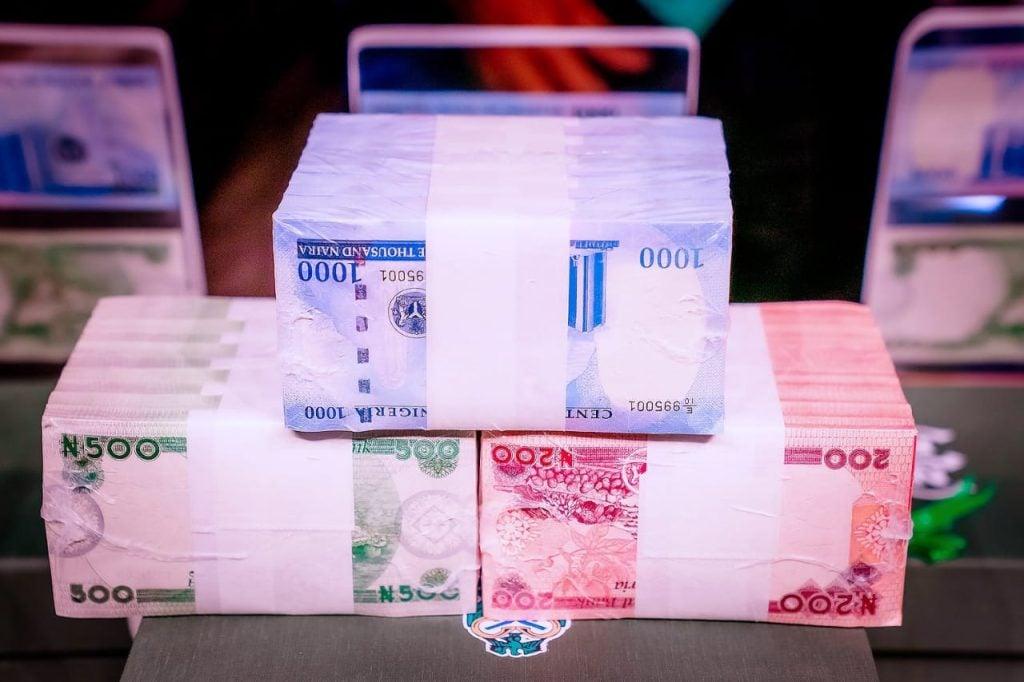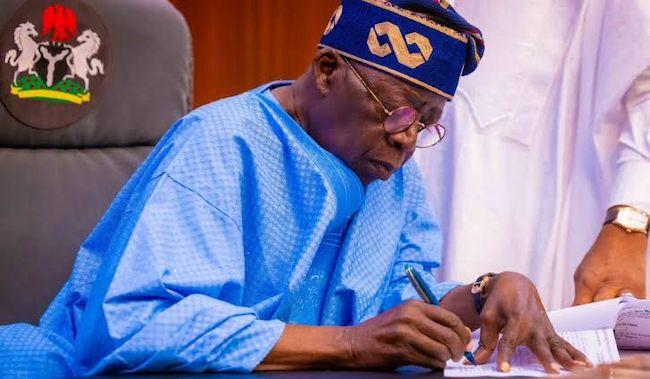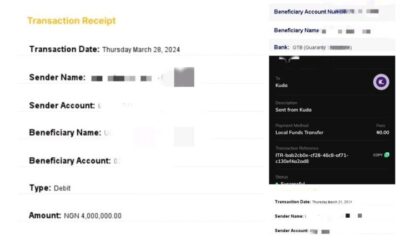Business
Why Naira Re-denomination Will Fail In Nigeria — Experts
Published
7 months agoon
By
Editor
Against the backdrop of sustained rumors about the introduction of the Naira re-denomination by the current government, economy analysts and corporate chieftains have painted a discomforting picture of what the policy may entrench on the economy if carried out.
In the past month, there have been many insinuations from several quarters that the Central Bank of Nigeria, CBN, is planning to onboard the measure as part of its overall monetary policy package from the new team at the apex bank.
Re-denomination is often used to describe a process in which a country adjusts its currency by changing the nominal value which changes the actual purchasing power of the currency.
Though the CBN had denied the rumor many sources hinted that the apex bank has already consulted officially for the policy roll out and may have slated January next year for commencement.
Some experts who spoke to Vanguard also believe that it is either the apex bank is flying a kite to sample public opinion or they are actually about to announce the policy because ‘‘there is not smoke without fire’’.
Giving insight into the policy measure some of them, however, told Vanguard that it can improve price stability by making transactions more manageable and reducing the likelihood of hyperinflation.
But they also said it’s essential to caution that Naira re-denomination alone won’t directly impact inflation rates positively.
Some also noted that the talks about redenomination may be part of the struggle by the current administration to gain the acceptance of the people, but also explained that the success or otherwise of re-denomination as an economy booster depends on its implementation and the complementary measures taken to address underlying economic issues, particularly in the areas of price stability, foreign investment, and engagement with key stakeholders.
There could be elements of truth with persistence of the rumor – Adonri
In his own comments, David Adonri, Financial Analyst and Executive Vice Chairman, at Highcap Securities Limited, said: “The re-denomination of the Naira was first muted by Charles Soludo’s Central Bank of Nigeria, CBN, leadership but CBN did not implement the plan. It has resurfaced again after Godwin Emefiele shelved it. When rumours persist for long, there could be elements of truth in them.
READ ALSO: LG Chairman Lauds UNICEF On Campaign Against Cervical Cancer In Bauchi
“However, since CBN has dispelled the rumor, we shall take their word for it but remain alert.
“On the surface, such a policy will match the foreign exchange rate with new value of the re-denominated Naira.
“However, the reality may not be the case. It is not likely to enhance price stability because Nigeria’s inflation is scarcity derived amidst severe shortage of hard currencies. The huge supply gap will make the program unsustainable.
“Under present economic conditions, re-denomination will be an exercise in futility. It could further weaken the Naira and reduce the purchasing power of consumers as producers will lash on the opportunity to increase prices.”
It would amount to further macroeconomic instability — Olayinka
Reacting to the alleged plan by the CBN to redenominate the Naira, Tajudeen Olayinka, CEO, Wyoming Capital and Partners said: “Since CBN has continually denied the plan to embark on such a program, I also don’t find the rumor credible.
“However, should they eventually decide to embark on that journey now, I will advise they delay such a decision till a more auspicious time.
“And the reasons are simple: You cannot embark on currency redenomination when you are still grappling with the difficulty of stabilizing the macroeconomic environment. Doing so means that you will have to repeat the program multiple times in a short period, as the effort would amount to further macroeconomic instability in the short term.
“The essence of currency redenomination is to strengthen the new lower denominations as the medium of exchange, store of value and unit of account, by improving on pricing mechanism in the economy, where rounding up of asset prices could be possibly avoided to stabilize the general price level.
“Doing it at the wrong time, when the economy is in a prolonged state of disequilibrium could be counter-productive, as instability may soon return.
“With the current poor state of Nigeria’s foreign reserves and multiple emergency foreign borrowings coming up to create dollar liquidity, it could send a wrong signal to foreign investors that Nigeria is in an emergency situation, and that proper forecast of future exchange rate might be difficult.
“As mentioned earlier, currency redenomination is good for an economy that is currently enjoying a semblance of macroeconomic stability, so that its timely adoption could promote further stability. Doing it at a wrong time will not be helpful to effective exchange rate post-redenomination.
READ ALSO: AfDB, Partners Inject $1bn To Fund Nigeria’s SAPZs
“The government should continue to run its ongoing adjustment program, with the appropriate policy framework, to a point of restoring external equilibrium, before embarking on currency redenomination, in order to have a stable effective exchange rate, post-redenomination.
“Good and careful planning of currency redenomination program, with timely implementation, could herald a new beginning for macroeconomic stability, especially, a new era of a very low or near absence of inflation, due to improved pricing mechanism in the economy.”
Re-denomination can aid price stability, but … — Adebija
For Gbenga Adebija, Chief Executive Officer, Business in Nigeria/ Former Director-General of the Nigeria-German Chamber of Commerce, the talks about redenomination may be part of the struggle by the current administration to gain the acceptance of the people.
He also explained that the success or otherwise of re-denomination as an economy booster depends on its implementation and the complementary measures taken to address underlying economic issues, particularly in the areas of price stability, foreign investment, and engagement with key stakeholders.
He stated: “The Tinubu administration is evidently working to establish trust and credibility with the public. Therefore, it is crucial to grant them the benefit of the doubt on this matter until proven otherwise’’.
However, he gave further insight on what should happen in the event of embarking on such policy.
He stated: “Re-denomination, in isolation, does not impact the exchange rate because it doesn’t alter the actual value of the currency relative to other currencies.
“Consequently, the exchange rate of the (Naira) re-denominated currency with others should remain relatively stable.
‘‘Re-denomination can, however, contribute to price stability by simplifying price calculations and accounting which are usually impacted by high inflation rates.
“Re-denomination, by itself, does not influence the true value of the currency or the economic fundamentals of the country. It primarily alters the way prices are expressed and how people interact with the currency.
“Often, it serves as a prelude to broader economic and monetary reforms, such as addressing inflation or introducing a new, more stable currency.
‘‘Therefore, the success of Naira re-denomination as an economy booster depends on its implementation and the complementary measures taken by the Government and Central Bank to address underlying economic issues, particularly in the areas of price stability, foreign investment, and engagement with key stakeholders.”
READ ALSO: BEDC Staff Electrocuted While Trying Fix Faulty Cable
Enabling environment should come before re-denomination — Azeez
Also speaking to Vanguard on the Naira re-denomination kite, Olowu Babs Azeez, National Treasurer of the Association of Mobile Money and Banks Agents of Nigeria (AMMBAN), noted that since CBN has not said it would embark on the policy it is not necessary to appraise the policy.
However, Azeez who is also the Chief Executive Officer of Obat Global Investment Limited, stated: “If such should happen, the government should first do the needful by providing enabling environment for business to thrive which would encourage foreign investors, promote small scale businesses and sizeable numbers of entrepreneur.
“This has to do with good roads, adequate electricity supply, business-friendly government policy, tax reduction, avoid unnecessary levels on business establishment, reduce export duty and import duty on raw materials but increase import duty on products that can be manufactured or produced in Nigeria in other to promote local production.
“I believe with this, the economy has lot to benefit and it will strengthen our currency.”
Focus should be on comprehensive economic reforms – Oyelaja
Abiodun Oyelaja, Chief Executive Officer Motion Yield Nigeria Ltd, said Naira re-denomination does not affect the exchange rate.
He explained thus, “The term “redenomination” is often used to describe a process in which a country adjusts its currency by changing the nominal value of its currency without changing its real value or the actual purchasing power of the currency.
“This is different from devaluation or revaluation, which involves changing the real exchange rate of a currency.
“Redenomination alone doesn’t directly affect the exchange rate. It’s mostly a psychological change, as the real value of the currency remains the same.
“Exchange rates are determined by various economic factors, including supply and demand, interest rates, and the overall health of the economy. It can however improve price stability by making transactions more manageable and reducing the likelihood of hyperinflation.
“However, it’s essential to caution that redenomination alone won’t directly impact inflation rates.
‘‘Redenomination is often part of a broader economic reform strategy. Nigeria should consider comprehensive economic reforms to address issues like inflation and exchange rate stability.
READ ALSO: IG Orders Treatment Of Gunshot Victims Without Police Report
“Care should also be taken to manage public expectations, as redenomination doesn’t solve underlying economic problems but can help improve currency management.
“Public education is essential if the government finally decides to undertake the reform strategy.
“The government through the CBN should closely monitor inflation rates and take measures to control inflation, which is a significant factor affecting the purchasing power of the currency.
“I advise that Nigeria should consider redenomination only as part of a more comprehensive economic strategy aimed at addressing issues related to exchange rates, inflation, and overall economic stability.”
Ghana’s example, Soludo justified
Most of the experts spoke on the Ghana experience which has spanned 17 years now without any positive result.
On the Ghana experience, Olayinka stated: “When Ghanaian government announced the program in 2006, the country’s economy had not attained a semblance of stability, hence, the continued instability in the economy. Coming back to Nigeria, it could have been an appropriate program in 2007, when Prof. Charles Soludo introduced it before it was ignorantly shut down by late President Yar’adua.
“At that time, Nigeria had a right macroeconomic environment for timely implementation of the program, which include the following: Huge foreign reserves, enough to cover 36 months of import bills; Stable exchange rate; Stable interest rate; Stable and low inflation; Low level of public debt; High velocity of money that was accompanied with low inflation (very unusual to have this phenomenon); Continuous FDI and FPI inflows; Steady and reasonable level of economic growth; Low level of unemployment; Cash Reserve Ratio of about 4% means that economy was not troubled in any way; Availability of consumer credit across the spectrum of the economy and steady growth in capital formation; A near efficient financial markets, etc.
‘‘So, Nigerian economy could have benefited more from Naira re-denomination in 2007. It was unfortunate that late President Umaru Yar’adua denied Nigeria the timely implementation of currency redenomination program in 2007.”
Speaking on the Ghana experience with re-denomination, Mr Oyelaja stated: “When Ghana carried out the redenomination of its currency, the Cedi in 2007, it adjusted the nominal value of the currency by removing four zeros from the currency, making the currency more manageable. The real value of the currency did not change. The process only aimed to simplify transactions and accounting.
“The lessons from Ghana’s re-denomination experience underscore the significance of meticulous planning, public education, and alignment of the re-denomination process with more extensive efforts to stabilize the economy.
READ ALSO: DSS Confirms Release Of Former EFCC Boss, Bawa
“It is essential to acknowledge that re-denomination is not a standalone remedy but should be an integral part of a comprehensive economic reform strategy.
“Thus, factors such as effective stakeholder communication, continuous monitoring and evaluation, coordination, and safeguarding the integrity of macroeconomic structures are of paramount importance.”
For Mr Adebija there are lots of lessons Nigeria can learn from the Ghana’s experience with the re-denomination policy.
He stated: “The lessons from Ghana’s re-denomination experience underscore the significance of meticulous planning, public education, and alignment of the re-denomination process with more extensive efforts to stabilize the economy.
“It is essential to acknowledge that re-denomination is not a standalone remedy but should be an integral part of a comprehensive economic reform strategy.
“Thus, factors such as effective stakeholder communication, continuous monitoring and evaluation, coordination, and safeguarding the integrity of macroeconomic structures are of paramount importance.”
On the Naira issue for Adonri, Ghana recorded a worsened economy arising from re-denomination.
He stated: “The program in Ghana failed to achieve the desired objectives. It worsened the purchasing power of the Cedi. Re-denomination is effective if the inflation is due to over-employment of the factors of production.
“Nigeria’s situation is the direct opposite with gross factor underemployment. It is not a viable option to pursue now if the economy is to be rescued.”
VANGUARD
You may like


Naira Slumps, Exchanges At Over N1,500 Against Dollar


Find The Man Who Stole $30000 From Me, Get $2000 Reward – Nigerian Man Cries Out


Dangote Speaks On Devaluation Of Naira


Mixed Reactions Trail Video Of Couple’s Customised N200 Notes


Naira Abuse: EFCC To Arraign Cubana Chief Priest Wednesday


Naira Abuse: ‘Ask Bob For Update’ – EFCC Issues Threat To Culprits
Business
Tinubu Okays Payment Of N3.3tn Power Sector Debts, Gencos, Gas Producers To Get N1.3tn, $1.3bn
Published
13 hours agoon
May 17, 2024By
Editor
As part of the measures to tackle incessant power outages in the country, President Bola Tinubu has approved the gradual payments of power sector debts estimated at over N3.3tn.
Consequently, about N1.3tn owed power generating companies by the Federal Government will be paid via cash injections and promissory notes, while about $1.3bn (N1.994tn using the current official closing rate) owed to gas companies will be paid via cash and future royalties.
Already, the Federal Government has commenced payment of the cash part of the N1.3tn debt owed Gencos and concluded plans to settle the second part via promissory notes within a timeframe ranging from two to five years.
The Minister of Power, Chief Adebayo Adelabu, disclosed this at the 8th Africa Energy Marketplace held on Thursday in Abuja.
The event was themed, “Towards Nigeria ‘s Sustainable Energy Future: Policy, Regulation and Investment – A Policy Dialogue for the National Integrated Electricity Policy and Strategic Implementation Plan.”
The government is subsidising electricity by shouldering the gas payment component for power generation.
But over the years this payment has not been steady, leading to humongous gas debts as well as indebtedness to power generation companies.
Disclosing the solution to the issue, Adelabu stated that Tinubu had directed the Minister of Finance to make immediate payment of N130bn from the Gas Stabilisation Fund, being part of the N1.3tn owed Gencos. The rest will be spread over some time.
The power minister further explained that the payment of $1.3bn legacy debts owed gas producers would be sourced from future royalties and income streams in the gas sub-sector, a solution deemed satisfactory by the gas-supplying companies.
He said, “It is true that I mentioned that Mr President has approved the submission of the Hon. Minister of State Petroleum (Gas) to defray the outstanding debts owed to the gas supplying companies to the power sector operators.
“The payments will be in parts. We have the legacy debt and we have the current debt. For the current debt, approval has been given for a cash payment of about N130bn from the Gas Stabilisation Fund, which the Federal Ministry of Finance will pay, if not already paid.
“The payment for the legacy debts is going to be made from future royalties and streams of income in the gas sub-sector which is quite satisfactory to the gas supply companies. The last amount that was being quoted was $1.3bn, which we believe will go a long way to encourage these gas companies to enter into firm supplying contracts with the power generating companies.”
He further explained, “The situation we are in now is on a best endeavour model, which means there is no firm contract between the gas companies and the majority of the power generating companies. The day they can supply gas, they will, the day they cannot supply gas, there is no penalty. But once there is a firm contract they will be under contractual obligations to supply gas to these power-generating companies so that we can have a consistent power generation.
READ ALSO: B-I-Z-A-R-R-E! Man Missing For 26 Years Found Alive In Neighbour’s House
“So, that is the situation and the model we want to adopt for the gas segment of the power sector value chain.”
Continuing, the minister voiced concerns about the lack of policy coordination in the power sector, assuring the sector however that the current administration was committed to eliminating all bottlenecks in the industry.
Adelabu also justified the Band A tariff hike, saying that only 15 per cent of Nigerians were affected.
He disclosed that without proper billing, the power reform agenda of the present administration might not be achieved.
The minister also revealed that with the generation of 700MW from the Zungeru hydroelectric power plant, the Nigerian Electricity Supply Industry has recorded a new feat of 5,000MW.
Regarding the power-generating companies, he noted that the president had approved cash injections and promissory notes, providing significant encouragement to the companies and incentivising them to further invest in generation capacity.
The minister explained, “For the power generating companies, the debt is put at N1.3tn. I can also tell you that we have the consent of Mr. President to pay on the condition of settling the reconciliation of these debts between the government and the power-generating companies.
“And this, we have successfully done, and it is being signed off by both parties now. The majority have signed off, and we are engaging others to ensure we have a 100 per cent sign-off from the power-generating companies. And the modalities for paying this will be in two ways. Of course, there will be a cash injection, immediate cash injection.”
He added, “Government is not buoyant enough to pay down N1.3tn once and for all in terms of cash. But there is a fraction of it that will be paid in cash while the remaining fraction will be settled through a guaranteed debt instrument, preferably a promissory note. That is more like a comfort to these companies that in the next two, three to five years, the government is ready to defray this debt finally. This will go a long way to encourage the power generating companies to incentivise them to even invest more in generation so that you can know our generating output from the level it is now to a higher level because as I mentioned, there is an opportunity for demand locally and across the border. And that is a source of foreign exchange earnings for the country.”
Adelabu, who said the supply of electricity had increased due to the implementation of the Electricity Act 2023 and the Band A tariff, added that the Discos were requesting more load for onward distribution to their customers.
The power minister had stated in February that Nigeria must begin to move towards a cost-effective tariff model, as he revealed that the country was indebted to the tune of N1.3tn to electricity generating companies, while the debt to gas companies was $1.3bn at the time.
READ ALSO: JUST IN: NCC Suspends Issuance Of Virtual Operators Licence, Two Others
On March 1, 2024, The PUNCH reported that the Federal Government had paid $120m out of the $1.3bn indebtedness to gas companies for the supply of gas to run gas-fired power plants across the country.
Nigeria is currently suffering from low power supply because gas supply has been reduced after some operators stopped supplying the commodity to power-generating companies due to the indebtedness of the Gencos to gas-producing firms.
Adelabu recently revealed that the crash in power generation and attendant poor supply in January was because gas suppliers stopped supplying gas for the generation of electricity due to the indebtedness of the sector to gas producers.
Nigeria gets more than 70 per cent of its electricity from thermal power plants that run on gas. The remaining amount of electricity comes from hydropower-generating plants.
Speaking at the 7th Nigeria International Energy Summit in Abuja in March, the Director, Decade of Gas Secretariat, Ed Ubong, expressed excitement that the Federal Government had cleared $120m out of the $1.3bn gas debts.
The Decade of Gas Secretariat is under the Federal Ministry of Petroleum Resources (Gas). The Federal Government is subsidising electricity by paying for the gas used in generating power, as Nigerian power users are currently not paying the exact amount for electricity.
“As of last year, that (gas debts) was about $1.3bn, depending on how you add up the numbers. But I am pleased that between October and the end of January, the government has paid over $120m to offset some of that money,” Ubong stated.
Meanwhile, the African Development Bank is set to seek board approval for a $1bn policy-based operation with a significant energy component to support the reforms initiated by the new Electricity Act, of 2023. This funding aims to actualise the outcomes expected from the NIEP-SIP and attract sustainable investments.
The Vice President, Power, Energy, Climate and Green Growth Complex at the AfDB, Dr. Kevin K. Kariuki, disclosed this at the African Energy Market Place held in Abuja on Thursday.
The AEMP special edition focuses on the “National Integrated Electricity Policy and Strategic Implementation Plan,” reflecting the Federal Government of Nigeria’s ongoing reforms to enhance the power sector’s effectiveness, efficiency, and productivity.
Kariuki emphasised the alignment of the event with the bank’s “Light Up and Power Africa” initiative, which is part of its High 5 development strategy for the continent.
With Nigeria holding the highest electricity access deficit globally, the success of the reforms, including tariff adjustments and regulatory improvements, is crucial.
Kariuki highlighted the need to utilise over 13,000,000MW of installed capacity, improve transmission, reduce supply interruptions, and achieve financial viability across the power sector.
READ ALSO: Harry & Meghan: Outrage As UK Journalist Says Nigerians Are Nazis
The VP noted that the success of the Electricity Act would hinge on its ability to rapidly provide quality electricity access to all Nigerians, thereby addressing the country’s status as having the world’s highest electricity access deficit.
“With 90m Nigerians lacking electricity, the reforms are poised to utilize over 13 Gigawatt of installed capacity, improve transmission, reduce supply interruptions, and enhance the financial viability of the power sector.
“No economy can grow in the dark,” the VP stated, emphasising the critical role of reliable power in economic growth, industrialisation, and competitiveness.
The AfDB’s investments include the $256.2m Nigeria Transmission Expansion Project and the $200m Nigeria Electrification Project, which will construct transmission lines, substations, and mini-grids.
Furthermore, the AfDB is financing a study to explore the deployment of Battery Energy Storage Systems to stabilise the grid and promote renewable energy.
Nigeria’s participation in the $20bn Desert to Power initiative to generate 10,000MW of solar power in the Sahel region, was also mentioned as a key step toward increasing renewable energy in the country.
The AfDB boss expressed confidence that the AfDB’s multi-faceted approach, including policy support, infrastructure financing, and capacity building, would ensure a viable and sustainable power sector in Nigeria.
He called for a collaborative spirit among governments, the private sector, and partners to craft policy recommendations that would lead Nigeria to universal access by 2030 and zero carbon emissions by 2060.
Obi, Nnaji speak
Meanwhile, a former Minister of Power, Barth Nnaji, and the presidential candidate of the Labour Party in the 2023 general election, Peter Obi, have advised the Federal Government to declare an emergency in the power sector.
The duo spoke at the inaugural Dele Momodu Leadership Lecture held Thursday at the Nigerian Institute of International Affairs, Lagos.
Nnaji also called a super grid to end the incessant collapse of the national power grid.
Nnaji, who was the Guest Speaker at the event, said the current national grid kept collapsing because it was not well structured.
Recall that the national grid collapsed more than two times in the first quarter of 2024, plunging Nigerians into darkness.
READ ALSO: NDIC Obtains Order To Wind Down 96 Microfinance, Mortgage Banks
Touching on the theme, ‘Politics of Energy: The Way Forward’, Nnaji stated that the power ministry under his watch had years ago sought the approval of the Federal Executive Council to build what he called a super grid, a 765KV network that would rise above the existing 330 KV.
According to him, the 765KV is large enough to take power from high-capacity plants like the Manbilla Power Plant.
He revealed that the country has yet to have a transmission network that could wheel power from Manbilla when completed.
Nnaji explained, “Another critical area in Nigeria’s power sector is the transmission network. I believe that having the national grid the way we have it still going to be a problem. First, it is not robust, and it is not well structured. My advocacy is for multiple grids, autonomous but connected to the national grid. So that the national grid still operates, and will be more robust. It will begin to cure the regular incident of the failure of the national grid.
“When I was in government, we asked the Federal Executive Council to approve what we called a super grid, a 765KV network that will kind of rise above the existing 330KV network. Right now, Nigeria has 330KV and 132KV, but none of them is robust. But the 765KV network will be very important to take power from power plants such as the Manbilla that has been on for a while. Over 10,000 megawatts of power will come from Manbilla. So, the question is, which transmission infrastructure will take that power suppose that we finish it now? We need a super grid to take that power so that Nigeria can take power from various plants and transmit it to wherever we want it.”
The Chairman of Geometric Power commended Adelabu for reviving the super grid project.
“I am happy that the current Minister of Power, Adebayo Adelabu is reviving this super grid, and I think we have to spot him on that because it is a very important project. Our conception was that it would be done in sections by various companies so that it would not be one of these white elephant projects,” he said.
Nnaji expressed concern that still suffers gas shortages in the power sector despite its abundant natural gas reserves.
He wondered why the nation keeps exporting gas that is not yet enough for domestic use, calling for a state of emergency in the gas sector.
“A state of emergency needs to be declared in the gas sector. The declaration will save the power sector and allow the government and other stakeholders to address fundamental issues in the gas sector in a robust manner. The issue will include how to strike a healthy balance between producing gas for export and gas for domestic consumption,” he noted.
The former minister regretted that the Federal Government has not executed a power project since almost nine years ago, adding that some ongoing ones were abandoned by successive administrations.
READ ALSO: JUST IN: Convicted Kidnap Kingpin Evans Re-arraigned, Opts For Plea Bargain
“The development of the power sector has also been stalled for years because of the suspension of what we developed that time called partial risk guarantee to support power purchase agreement. A government that is buying power has to issue a power purchase agreement to the producer of power, and the agreement must be guaranteed.
“We were able to do this but only one project was completed, that is the Azura-Edo project, a 461MW power plant; and then it was stopped nine years ago. The outcome is that for this period, Nigeria has not commissioned a government-sponsored power project. And the former President of Ghana said you need to be adding over 12 per cent of energy to your country yearly. If you want to grow the economy, that’s what you need. If in nine years, we have not added anything, you can imagine. I want to tell you that because of that partial risk guarantee, four or five major projects had been fully developed but stopped. I encourage the government to reawaken those projects. They are very critical,” Nnaji added.
Earlier in his speech, former Ghanaian President, John Mahama, disclosed that Ghana had been able to power generation capacity to 5454MW, saying the country had been exporting electricity to other neighbouring countries in the West of Africa like Togo, Benin Republic and others.
Mahama remarked that Nigeria could achieve energy security for itself and other African countries, adding that a nation must plan because the energy demand will keep rising by 10 per cent yearly.
On energy transition, Mahama urged African leaders to decide their modalities with Nigeria showing leadership.
Speaking, the presidential candidate of the Labour Party, Peter Obi, posited, “When the former president of Ghana said they are generating and distributing 5,000MW, I was wondering; Ghana with one-seventh of our population generates and distributes more than us. We must declare an emergency in power. The way to go is very simple, we need embedded power, with gas supply. We have gas all over the place. Yes, we need the dollars, but I think making Nigeria more productive and pulling our people out of poverty, especially in the north, will give us far more value and dollars than focusing on exports. I think it is time to declare an emergency. We should encourage an embedded power”.
The organiser of the lecture and publisher of Ovation Magazine, Dele Momodu, maintained that Nigerians pay for electricity without getting the same being delivered to their homes.
In his welcome address, the veteran journalist wondered why the electricity challenges in Nigeria have defied all solutions.
“Why can’t we stop this endless energy crisis in Nigeria? We pay for electricity, but it can’t be delivered. The more we pay, the less we get,” he said.
Momodu lamented that the humongous money invested in the power sector over the years has not yielded any result.
This, he stated, informed his decision to organise the public lecture in commemoration of his 64th birthday.
Others at the lecture were Governor Ademola Adeleke of Osun State; former Governor Rabiu Kwankwanso of Kano State; former Governor Donald Duke of Cross River; the Ooni of Ife, Oba Adeyeye Ogunwusi and others.
PUNCH
Business
Naira Slumps, Exchanges At Over N1,500 Against Dollar
Published
4 days agoon
May 13, 2024By
Editor
The naira continued its depreciation against the US dollar in the foreign exchange market.
Data from the parallel market section and FMDQ showed further depreciation against the dollar on Monday.
At the parallel market, a Bureau De Change operator in Wuse Zone 4, Mistila Dayyabu, told DAILY POST that the naira was sold as high as N1,517 per dollar on Monday before settling at N1,500 per dollar.
“On Monday morning, the dollar was sold at N1,517 per dollar. However, on hearing the information about the coming of the Economic and Financial Crimes Commission operatives, we started selling at N1,500 this evening, ” he said.
READ ALSO: Why Naira Is Falling – Economist, Rewane
The figure increased from the N1, 450 per dollar it traded at the weekend.
Similarly, at the official market, FMDQ data showed that they dipped to N1478.11 per dollar on Monday from N1466.31 last Friday.
This represents an N11.8 drop from the N1466.31 recorded last Friday.
Earlier, the Central Bank of Nigeria Governor, Olayemi Cardoso, said the apex bank’s Monetary Policy Committee will do everything to bring down soaring Nigeria’s inflation, which stood at 33.22 per cent in March 2024.
Business
CAC Opens Centre For Registration Of PoS Operators
Published
1 week agoon
May 9, 2024By
Editor
The Corporate Affairs Commission has inaugurated a centre for bulk registration of Point of Sale operators in its database.
The CAC Registrar-General, Hussaini Magaji, said this while inaugurating the centre stationed at its Federal Capital Territory Office in Abuja on Wednesday.
According to Magaji, the importance of registering the PoS operators in the commission’s database cannot be over emphasised.
He said the centre was well equipped with all the necessary facilities to operate 24 hours a day and ensure the commission’s achievement of its purpose.
READ ALSO: ICYMI: FG To Delist Naira From P2P Platforms
“What we did was accommodate the request from the Fintechs.
“We have allowed them to integrate with the Corporate Affairs Commission; they have developed their structure, and we gave them access.
“Once they supply the necessary details for registration on their platform, the certificate is generally generated and transmitted directly to their platform without them having to contact anyone.
“We have done this to ensure that everyone gets it easy without hitches, but if they choose to apply manually, we have a secretariat open for them to do so,” he stated.
READ ALSO: ICYMI: FG Gives Deadline To PoS Operators To Register With CAC
Recall that the Federal Government through the CAC on Tuesday issued a two-month registration deadline to Point of Sales companies, to register their agents, merchants, and individuals with the commission in line with legal requirements and the directives of the Central Bank of Nigeria.
Meanwhile, at the event, the registrar-general reiterated that the centre would be opened to all operators in the fintech industry who voluntarily submitted their agents and merchants for regularisation with the CAC.
Magaji said that the registration was in line with President Bola Tinubu’s desire to ensure financial inclusion for the youth and strengthen the fight against fraud, finance and other crimes in the country.
He further expressed his resolve to ensure compliance with the provisions of Section 863 (1) of the Companies and Allied Matters, CAMA 2020, and the CBN guidelines for Agent Banking, 2013.
READ ALSO: ICYMI: Five Things To Know About The New Cybersecurity Levy To Be Paid By Nigerians
On security, the CAC boss said that if a crime were committed using the PoS, the government would easily trace the perpetrators to the CAC data platform if such machines were registered.
“If an incident happens and they report it to CAC, if we do not have the operator’s details, we cannot respond, and that is the essence of this registration.
“The registration ensures that every detail of the person is provided, including NIN, passport photograph and all other useful documents.
“And it is an opportunity for more people to be captured into the formal sector,” he said.
The News Agency of Nigeria reports that the Special Adviser to the President on ICT Development and Innovation, Tokoni Peter attended the event.
The event was attended by Dr Salihu Dasuki, the Special Adviser to the President on ICT Policy Office, the PoS operators, and other stakeholders.
(NAN)

Oyo Govt To Clampdown On Tricyclists Without Permit, Defaced Windscreen

Edo: ‘They Want To Chase Us Out Of Our Communities’ – Residents Protest Alleged Harassment, Petition AIG

Lagos Hotel Showcases ‘Most Advanced Room In West Africa’ That Costs Over N1m Per Night
Trending

 Headline4 days ago
Headline4 days agoLady Arrested For Allegedly Harassing, Cyberstalking Crown Prince Of Benin Kingdom [VIDEO]

 News4 days ago
News4 days agoEdo Govt Takes Custody Of 4-year-old Girl Used For Adult Content

 Entertainment3 days ago
Entertainment3 days agoVIDEO: Drama As Portable Jumps Gate To Evade Police Arrest

 Headline4 days ago
Headline4 days ago32-year-old Nigerian Doctor Killed In US, Father Mourns

 News3 days ago
News3 days agoMan Arrested For Invading Plateau Bank With Bomb

 News4 days ago
News4 days agoBREAKING: Organised Labour Shut BEDC Head Office

 Politics4 days ago
Politics4 days agoDefection: Edo Govt, Ex-PDP BoT Member, Idahosa In Verbal War

 News3 days ago
News3 days agoSee Lagos Environment Commissioner’s Funny Reply To Resident’s Complaint About Neighbours Moaning Loudly At Night

 News4 days ago
News4 days agoVIDEO: Lady Laments As Lagos Issues Demolition Notice Two Months After Property Purchase

 Headline4 days ago
Headline4 days ago‘You’re Guilty’ – Judge Roars, Jailed UK-based Nigerian Pastor, Wife 34 Years For Raping, Assaulting Members





































